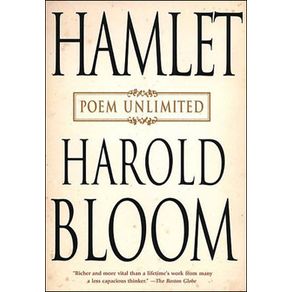The Prince of Denmark, argues the eminent Bloom, was not much loved by his father the warrior king or by his mother, Queen Gertrude. Developing themes from his Shakespeare: Invention of the Human, Bloom adds that Hamlet was instead rather detached, moving through life rather like the lead in his own personal drama, giving a theatrical flair to moments such as the death of Polonius and aptly choosing a play to "catch the conscience of the king." The closest thing he ever had to a parent was Yorick the Jester, and his confrontation with Yorick's skull followed shortly by his attending Ophelia's funeral dealt a serious double blow to his indifference. It was then that he moves grimly toward the climax and his own death. Bloom generates any number of provocative themes, such as Hamlet's notions about plays and acting as reflecting Shakespeare's own rivalries with Ben Jonson, and that the prince never loved Ophelia. Some of the chapters are really too short to do justice to their topics, raising more questions than answers. Nor is the last third of the book, on the play's place in our cultural heritage, up to the parts that focus on its contents, though it features fewer off-putting attacks on political correctness than Bloom's more polemical works. Still, this is not a tyro's book; Bloom makes no concessions to readers who lack a deep familiarity with the play. Nor is it for any reader with a thin skin about Bloom's assumptions about the Anglo-European literary legacy. Short, sophisticated and opinionated, this is a thorny goodie for Bardolators and Bloomians.



